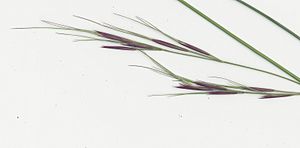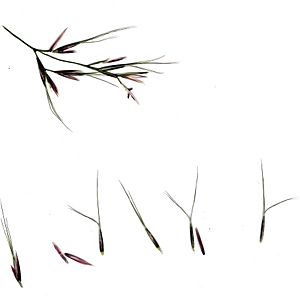Dark wiregrass facts for kids
Quick facts for kids Dark wiregrass |
|
|---|---|
 |
|
| Scientific classification |
|
| Kingdom: | Plantae |
| Clade: | Tracheophytes |
| Clade: | Angiosperms |
| Clade: | Monocots |
| Clade: | Commelinids |
| Order: | Poales |
| Family: | Poaceae |
| Genus: | Aristida |
| Species: |
A. calycina
|
| Binomial name | |
| Aristida calycina |
|
| Script error: The function "autoWithCaption" does not exist. | |
Script error: No such module "Check for conflicting parameters".
Dark wiregrass, also known by its scientific name Aristida calycina, is a type of grass. It is part of the large grass family, called Poaceae. This plant grows naturally in Australia.
What Does Dark Wiregrass Look Like?
Dark wiregrass is a plant that grows like a grass. It can be short and bushy, or grow taller and spread out. It usually reaches a height of about 0.3 to 2 meters (about 1 to 6.5 feet). Its stems, called culms, are strong and wiry. They also have many branches.
The leaves have a smooth covering at their base. They also have a tiny flap, called a ligule, which is only about 0.3 millimeters long. The leaf blades can be rolled up or folded. Sometimes, they are flat and about 1.5 millimeters wide.
The plant has special parts called glumes. These are shaped like a spearhead and are 6 to 20 millimeters long. The top part is blunt, and the bottom part is sharp. The inner part of the flower, called the lemma, is purple or brown. It has darker edges and is 6 to 9 millimeters long. The plant also has long, spreading bristles, called awns, which can be up to 30 millimeters long.
How Was Dark Wiregrass Named?
The dark wiregrass species was first officially described in 1810. This was done by a botanist named Robert Brown. He included it in his important work about Australian plants.
This plant has also been known by other names in the past. These include Aristida glumaris and Chaetaria calicina.
There are three different types, or varieties, of this species:
- Aristida calycina var. calycina
- Aristida calycina var. filifolia
- Aristida calycina var. praealta
Where Does Dark Wiregrass Grow?
You can find Aristida calycina mostly in the eastern parts of mainland Australia. It grows in Queensland, Victoria, New South Wales, and some areas of the Northern Territory. It is less common as you go further west.
In New South Wales, it grows in almost all areas. The only exception is the far southwest. This plant prefers to grow in sandy, poor soils.


